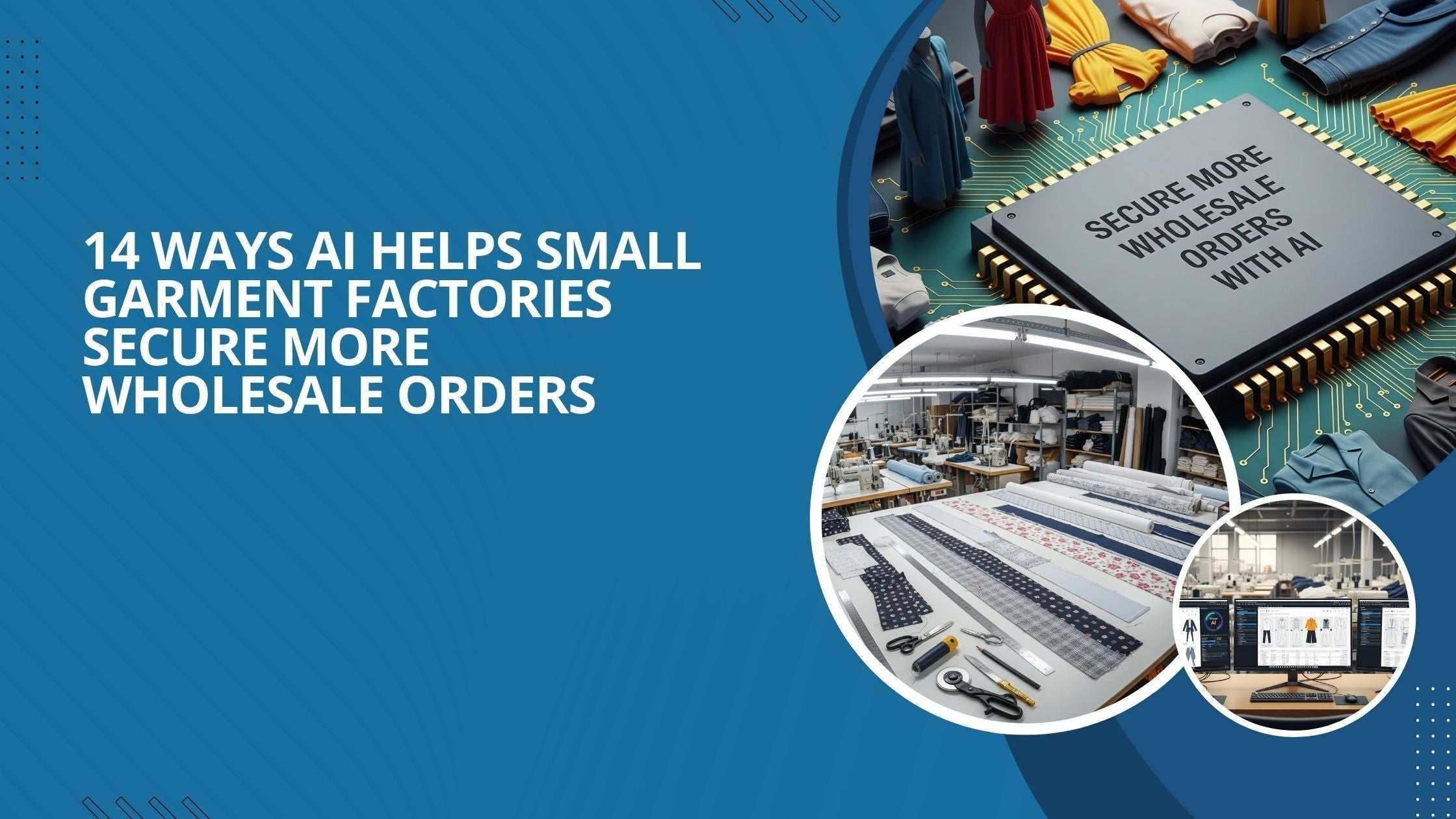14 Ways AI Helps Small Garment Factories Secure More Wholesale Orders
| Jul, 29 , 25
Why Small Garment Factories Struggle to Land Consistent Wholesale Orders
A few years ago, a small garment factory had just landed a promising meeting with a European streetwear brand. The brand loved the factory's craftsmanship, sustainability values, and competitive pricing. But when it came to negotiating a 10,000-piece wholesale order, things fell apart. The buyer hesitated—worried about production delays, inconsistent quality, and whether the factory could scale operations without compromising standards.
It's a story that has played out repeatedly.
Small garment factories and brands often bring creativity, agility, and craftsmanship to the table, but they're frequently overlooked when wholesale buyers seek partners for large orders. The perception? Too small to deliver at scale, too disorganized to trust, and too reliant on manual processes to ensure consistency.
But the landscape is changing fast, bringing a sense of relief to small garment factories.
Artificial Intelligence (AI) is empowering small garment factories and brands to punch far above their weight. From automated quality checks and predictive scheduling to smarter inventory and cost estimation, AI helps small-scale operations meet the expectations of global wholesale buyers—on time, on budget, and at scale.
In this blog, we'll explore 14 key ways AI empowers small garment factories to win more wholesale orders—not by pretending to be big, but by being faster, more innovative, and more reliable than ever before.

1. AI-Driven Production Planning Reduces Lead Times
For small garment factories, managing production efficiently can be a constant juggling act. AI revolutionizes this by introducing more intelligent allocation of the workforce and machinery. Instead of relying on guesswork or traditional methods, AI algorithms analyze current orders, available resources, and individual worker skills to optimize task assignments and allocate resources effectively. It means the right person and the right machine are always on the right job. Furthermore, AI utilizes predictive scheduling to avoid production bottlenecks. By analyzing historical data and real-time inputs, AI can identify potential choke points in the production line—whether it's a specific machine being overused or a team falling behind—and suggest preemptive adjustments. This proactive approach leads to smoother workflows, fewer delays, and ultimately, significantly reduced lead times, making your factory a more attractive partner for brands needing quick turnarounds.
2. Accurate Demand Forecasting Builds Buyer Confidence
One of the biggest anxieties for any garment factory, especially a smaller one, is knowing how much to produce. Accurate demand forecasting powered by AI helps avoid overproduction and understocking. AI models can analyze vast amounts of data, including past sales, seasonal trends, economic indicators, and even social media sentiment, to predict future demand with remarkable precision. It means you produce what's likely to sell, minimizing wasted materials and labor from overproduction, and ensuring you have enough inventory to meet orders without understocking. When you can demonstrate to buyers that you're prepared for volume and seasonality with data-backed predictions, it instills a high level of confidence, proving your reliability and foresight.

3. Automated Quality Control Ensures Consistency
Maintaining high and consistent quality across large wholesale orders is paramount for brands. Traditionally, this involved painstaking manual inspections, which are prone to human error and can be slow. AI-powered automated quality control changes the game. Computer vision systems detect defects in real time by scanning garments as they move through the production line. These systems can identify flaws, such as stitching errors, fabric inconsistencies, or misprints, with far greater speed and accuracy than the human eye. It enables small garment factories to maintain quality across bulk orders without significantly increasing costs, ensuring every piece meets the buyer's exact specifications and enhancing their reputation for reliability.

4. AI-Optimized Fabric Cutting Reduces Waste
Fabric is one of the most significant costs for any garment factory. Wasting material directly impacts profitability and sustainability. AI-optimized fabric cutting utilizes precision cutting software that improves material yield. This software intelligently nests pattern pieces on a fabric roll, calculating the most efficient layout to minimize leftover scraps. For small garment factories, this translates to lower costs resulting from reduced material consumption. Beyond the financial benefits, it also makes your operations more eco-friendly, a growing appeal to environmentally conscious wholesale buyers.
5. Intelligent Inventory Management Minimizes Stockouts
Delays in production or shipment due to missing materials are a nightmare for both factories and brands. Intelligent inventory management, powered by AI, provides real-time tracking and alerts for both raw materials and finished goods, ensuring seamless operations. AI systems continuously monitor stock levels, predicting when materials will run low based on production schedules and incoming orders. This proactive approach means you receive alerts before a stockout occurs, allowing you to reorder promptly. It ensures you never delay shipments due to missing inputs, guaranteeing a consistent supply and strengthening your relationship with wholesale buyers.

6. Visual AI for Sample and Prototype Review
The traditional process of creating, shipping, and reviewing physical samples can be incredibly time-consuming and expensive, particularly for small garment factories that deal with multiple design iterations. Visual AI for sample and prototype review helps speed up approvals with 3D modeling and virtual samples. Designers can create highly realistic digital prototypes that buyers can view and manipulate in a virtual environment. It dramatically reduces dependency on physical sample cycles, cutting down on shipping costs, development time, and material waste, making the design and approval process much faster and more agile for both the factory and the brand.
7. Automated Tech Pack Generation for Faster Turnarounds
Tech packs serve as the blueprint for garment production, detailing every aspect, from fabric to stitching. Errors or delays in tech pack creation lead to misunderstandings and production hiccups. Automated tech pack generation for faster turnarounds uses AI to assist in drafting these crucial documents. It helps reduce back-and-forth with accurate, AI-assisted documentation. AI can pull information from design files, material databases, and even past orders to populate tech packs quickly and accurately, minimizing manual data entry errors. The result? You can deliver what buyers ask for, exactly how they want it, with unprecedented speed and precision.
8. AI-Powered Order Customization at Scale
In today's market, many brands, especially niche ones, are looking for customization options for their wholesale orders. However, offering personalized products at scale has traditionally been a logistical challenge for small garment factories. AI-powered order customization at scale makes this feasible. AI systems can manage and track individual buyer-specific adjustments to designs, materials, or trims, eliminating the need for a massive manual workload. This ability to handle mass customization capabilities appeals to niche B2B buyers who value unique offerings, opening up new revenue streams for your factory.

9. Predictive Maintenance Keeps Machines Running
For a small garment factory, a broken machine can halt production and significantly impact delivery schedules. Predictive maintenance utilizes AI to ensure machines operate smoothly. Sensors on machinery collect data on performance, vibrations, and temperature. AI algorithms analyze this data to predict potential machine failures. It means you can schedule maintenance proactively, addressing issues before they cause a breakdown. Fewer breakdowns mean fewer production halts, ensuring on-time delivery builds buyer trust and strengthens your reputation for reliability.
10. Streamlined Compliance and Certification Workflows
Navigating the complex landscape of international compliance standards and certifications can be overwhelming for small garment factories seeking to secure global wholesale orders. Streamlined compliance and certification workflows powered by AI simplify this process. AI can organize and track standards, documentation, and audits, ensuring your factory meets all necessary regulations, from ethical labor practices to material certifications. It leads to faster onboarding for brands that need certified partners, as you can quickly provide all required proofs of compliance.

11. Enhanced Communication Through AI-Powered Dashboards
Clear and consistent communication is vital for strong relationships with wholesale clients. Enhanced communication through AI-powered dashboards provides transparency. These dashboards offer real-time updates on order status, timelines, and issues. Instead of numerous emails or calls, buyers can log in and see exactly where their order stands in the production cycle. It fosters transparent processes that reassure wholesale clients and build confidence, showcasing your professionalism and commitment to keeping them informed.
12. Pricing Optimization Through Cost Prediction
Quoting competitive prices for large wholesale orders can be challenging, particularly for small garment factories that must balance profitability with market demand. Pricing optimization through cost prediction uses AI to provide a data-driven edge. AI analyzes historical production data, material costs, labor expenses, and even market trends to calculate accurate production costs for large orders. This allows you to help factories quote confidently and competitively, ensuring you win bids while maintaining healthy margins.

13. Smarter Vendor and Material Selection
The reliability of your suppliers directly impacts your ability to meet production deadlines and maintain quality. Smarter vendor and material selection powered by AI helps mitigate risks. AI can analyze data on various suppliers based on their historical performance, material availability, pricing, delivery times, and quality ratings. It then suggests optimal suppliers based on availability, cost, and delivery. It reduces the guesswork and helps you avoid delays caused by unreliable sourcing, ensuring a consistent flow of high-quality inputs for your production.
14. Data-Driven Buyer Behavior Insights
Understanding your wholesale buyers is key to securing repeat business and tailoring your offerings effectively. Data-driven buyer behavior insights leverage AI to give you a competitive edge. AI analyzes past orders, preferences, reorder patterns, and even communication history to identify trends and individual buyer needs. This enables you to tailor pitches and offerings that align with buyer expectations, proposing relevant products or services even before they are requested, thereby deepening client relationships and increasing sales opportunities.

Ready to transform your small garment factory and secure more consistent wholesale orders?
Connect with EverLighten today and discover how our AI-powered platform can empower your business. We offer:
-
100% Customization: Tailor your offerings to meet the specific needs of any buyer.
-
100% Quality Check: Ensure every garment meets the highest standards.
-
Free Design Help: Bring your and your clients' visions to life.
-
Worldwide Delivery: Expand your reach to global markets.
-
24/7 Support: We're here to assist you every step of the way.
-
Unlimited Revisions: Perfect your designs before production.
-
Low MOQ: Start with manageable quantities.
Ready to discuss your garment needs? Let EverLighten be your partner in growth. Contact us today to receive a quote and schedule a consultation.
FAQs
1. How can AI help my small factory compete with larger manufacturers for wholesale orders? AI provides tools for efficient production planning, accurate forecasting, automated quality control, and streamlined communication, allowing smaller factories to offer the reliability, speed, and quality that wholesale buyers demand, effectively leveling the playing field.
2. Is implementing AI solutions expensive for a small garment factory? While some sophisticated AI systems can be costly, there are increasingly accessible and scalable AI-powered platforms, such as EverLighten, that offer solutions tailored to the needs and budgets of small businesses.
3. Do I need to hire data scientists or AI experts to use these technologies? Not necessarily. Many AI-powered platforms are designed to be user-friendly, featuring intuitive interfaces that require minimal technical expertise. The platform vendors often provide support and training.
4. How secure is the data shared with AI-powered platforms? AI platform providers that you can trust prioritize data security as a top concern. They employ robust safeguards to protect your sensitive information. It's essential to choose vendors with transparent data privacy policies.
5. Can AI help us understand the latest fashion trends for our wholesale clients? Yes, AI can analyze vast amounts of data, including social media, online retailers, and fashion publications, to identify emerging trends and provide valuable insights for your design and production decisions, helping you cater to current market demands.

